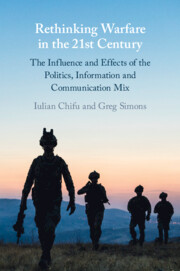 Rethinking Warfare in the 21st Century
Rethinking Warfare in the 21st Century Book contents
- Rethinking Warfare in the 21st Century
- Rethinking Warfare in the 21st Century
- Copyright page
- Dedication
- Contents
- 1 Introduction: Motivation, Purpose and Structure of the Book
- 2 Informational Warfare: A Theoretical Approach
- 3 Understanding Political and Intangible Elements in Modern Wars
- 4 The Fourth Generation of Informational Warfare
- 5 The Culture and Language of Contemporary Armed Conflict
- 6 Different Shades of Information and Communication in Armed Conflict: White, Grey and Black
- 7 The Effects of Technological Evolution and Social Media on the Individual, Society and Politics
- 8 Western Hybrid Warfare: Crisis and Subversion in Regime Change
- 9 Geopolitics in the Age of Social Media: The Struggle for Influence on Ukraine
- 10 The Ukrainian and Syrian Conflicts: Civil Wars or Geopolitical Shatterbelts?
- 11 The Impact of the COVID-19 Pandemic on Humankind, Society, and Politics
- 12 Conclusion: Summing Up the Knowledge and Answering the Questions
- Index
- References
3 - Understanding Political and Intangible Elements in Modern Wars
Published online by Cambridge University Press: 29 June 2023
- Rethinking Warfare in the 21st Century
- Rethinking Warfare in the 21st Century
- Copyright page
- Dedication
- Contents
- 1 Introduction: Motivation, Purpose and Structure of the Book
- 2 Informational Warfare: A Theoretical Approach
- 3 Understanding Political and Intangible Elements in Modern Wars
- 4 The Fourth Generation of Informational Warfare
- 5 The Culture and Language of Contemporary Armed Conflict
- 6 Different Shades of Information and Communication in Armed Conflict: White, Grey and Black
- 7 The Effects of Technological Evolution and Social Media on the Individual, Society and Politics
- 8 Western Hybrid Warfare: Crisis and Subversion in Regime Change
- 9 Geopolitics in the Age of Social Media: The Struggle for Influence on Ukraine
- 10 The Ukrainian and Syrian Conflicts: Civil Wars or Geopolitical Shatterbelts?
- 11 The Impact of the COVID-19 Pandemic on Humankind, Society, and Politics
- 12 Conclusion: Summing Up the Knowledge and Answering the Questions
- Index
- References
Summary
Chapter three concerns the role and influence of politics and other intangible elements in modern warfare. This is taken from a historical perspective with the philosophy of great military strategy thinkers such as Sun Tzu, Niccolo Macchiavelli and Carl von Clausewitz, and the influence of their ideas on the contemporary information war battlefield that runs parallel to physical wars.
Keywords
Information
- Type
- Chapter
- Information
- Rethinking Warfare in the 21st CenturyThe Influence and Effects of the Politics, Information and Communication Mix, pp. 58 - 78Publisher: Cambridge University PressPrint publication year: 2023